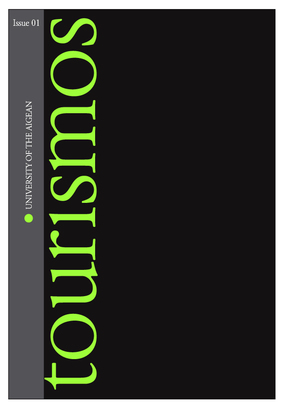Locally and socially embedded tourism clusters in rural Greece
Part of : Tourismos : an international multidiciplinary journal of tourism ; Vol.7, No.1, 2012, pages 99-116
Issue:
Pages:
99-116
Section Title:
Research papers
Author:
Abstract:
Creating a local identity through clustering of attractions, services and products in a region seems to be the contemporary answer in maintaining economic and social viability. Despite the growing interest in tourism clusters, it is still a field that remains unexplored especially in rural areas which have additional drawbacks to entrepreneurship. In this paper we will focus on the development of tourism clusters within the framework of Community Initiative LEADER+ in rural areas in Greece. Both qualitative and quantitative data from several case studies of clustering in Northern Greece and a survey on 110 cluster members are used to answer our basic research questions. Evidence from our study suggest that those tourism clusters are locally and socially embedded, are driven from different networking norms and levels of trust amongst members and are in need of motivation, encouragement and assistance from local stakeholders.
Subject:
Subject (LC):
Keywords:
tourism clusters, rural, networking, trust
Notes:
Περιέχει σχήματα, πίνακες και βιβλιογραφία
References (1):
- Breda, Z., Costa, R. & Costa, C. (2006). Do Clusters and Networks Make Small Places Beautiful? The Case of Caramulo (Portugal). In L. Lazzeretti and C. Petrillo (Eds.) Tourism Local Systems and Networking, The Netherlands: Elsevier.Brunori, G. & Rossi, A. (2000). Synergy and Coherence trough collective action: some insights from wine routes in Tuscany. Sociologia Ruralis, Vol. 40, No.4, pp.409-423.Courtney, P. & Moseley M. (2008). Determinants of local economic performance; experience from Rural England. Local Economy, Vol. 23, No.4, pp.305-318.D’Haese, M., De Ruijter De Wildt, M. & Ruben, R. (2008). Business incomes in rural Nicaragua: the role of household resources, location, experience and trust. Entrepreneurship and Regional Development, Vol. 20, pp. 345-366.Dodds, R. & Butler, R. (2010). Barriers to Implementing Sustainable Tourism Policy in Mass Tourism Destinations. TOURISMOS An International Multidisciplinary Journal of Tourism, Vol. 5, No.1, pp.35-5.3Ferreira, J. and Estevao, C. (2009) Regional Competitiveness of Tourism Cluster: A Conceptual Model Proposal. Http://mpra.ub.uni-muenchen.de/14853/1/MPRA_paper_14853.pdf Accessed the 30 th of August 2010, at 12:54.Ghada Abd-Alla, K. (2007). Service quality of travel agents: the view point of tourists in Egypt. TOURISMOS An International Multidisciplinary Journal of Tourism, Vol. 2, No.1, pp.63-87.Huggins, R. (2000). The success and failure of policy-implanted inter-firm network initiatives: motivations, processes and structure. Entrepreneurship and Regional Development, Vol. 12, pp.111-135.Klerkx, L. & Leeuwis, C. (2009). Shaping collective functions in privatized agricultural knowledge and information systems: the positioning and embedding of a network broker in the Dutch dairy sector. Journal of Agricultural Education and Extension, Vol. 15, No.1, pp.23-47.Koutsouris, A. (2004). The weak link in Rural Development: participatory processes in the agricultural knowledge and information systems. In A. Papadopoulos (Ed.) Development in a Multifunctional Rural Space, Athens: GUTENBERG.Kozak, M. (2004). Destination Benchmarking. Concepts, practices and operations. UK, CABI Publishing.Lee, J., Arnason, A., Nightingale, A. & Shucksmith, M. (2005). Networking: Social Capital and Identities in European Rural Development. Sociologia Ruralis, Vol. 45, No.4, pp.269-283.Lynch, P.A. & Morrison, A. (2007). The Role of Networks. In E. Michael (Eds.) Micro-Clusters and Tourism Networks: The Growth of Tourism, Oxford: Elsevier.Lockie, S. (2006). Networks of Agri-Environmental Action: Temporality, Spatiality, and Identity in Agricultural Environments. Sociologia Ruralis, Vol. 46, No.1, pp.22-39.Meccheri, N. & Pelloni, G. (2006). Rural Entrepreneurs and Institutional Assistance: an Empirical Study from Mountainous Italy. Entrepreneurship and Regional Development, Vol. 18, No.5, pp.371-392.Michael, E. (2007). Micro-clusters in Tourism. In E. Michael (Ed.) Micro-Clusters and Tourism Networks:The Growth of Tourism. Oxford: Elsevier.Novelli, M., Schmitz, B. & Spencer, T. (2006). Networks, clusters and innovation in tourism: A UK experience. Tourism Management, Vol. 27, pp.1141-1152.OECD (2006). The new Rural Paradigm: Policies and Governance. Http://www.sourceoecd.org/governance/9264023909. Accessed the 14 th of February 2010, at 12:00.Papahroni, M. (2007). Social Capital and Clusters. Greek Sociology Review, Vol.123, No.B, pp.55-77.Patronis, V. (2004). Characteristics and perspectives of social economy in a multiactivate countryside. In A. Papadopoulos (Eds.) Development in a Multifunctional Rural Space, Athens: GUTENBERG.Rosenfeld, S. (2002). Creating smart systems. A guide to cluster strategies in less favored regions. European Union- Regional Innovation Strategies Regional Technology Strategies. Carrboro. North Carolina. USA. Http://ec.europa.eu/regional_policy/innovation/pdf/guide_rosenfeld_final.pdf. Accessed the 11 th of January 2010, at 10:00.Siardos, G. (1997). Methodology for Rural Sociological Research. Thessaloniki, ZITI Publications.Shin, Y. (2009). Examining the link between visitors’ motivations and convention destination image. TOURISMOS An International Multidisciplinary Journal of Tourism, Vol. 4, No.2, pp.29-45.Shone, M. & Memon, A. (2008). Tourism, Public Policy and Regional Development: A turn from Neoliberalism to the New Regionalism. Local Economy, Vol.23, No.4 pp. 290-304.Sonnino, R. The power of place: embeddedness and local food systems in Italy and the UK, Anthropology of food. Http://aof.revues.org/index454.html Accessed the 14 th of July 2010.Svensson, B., Nordin, S. & Flagestad, A. (2006). Destination Governance and contemporary Development Models. In L. Lazzeretti and C. Petrillo (Eds.) Tourism Local Systems and Networking, The Netherlands: Elsevier.Terluin, I.J. (2003). Differences in economic development in rural regions of advanced countries: an overview and critical analysis of theories. Journal of Rural Studies, Vol. 19, pp.327-344.Theofanides, P. (2007) Country Report: Greece, Europe INNOVA Cluster Mapping Project. Http://www.clusterobservatory.eu/upload/Policy_Report_Greece_20080116.pdf Accessed the 30th of August 2010, at 12:50.




